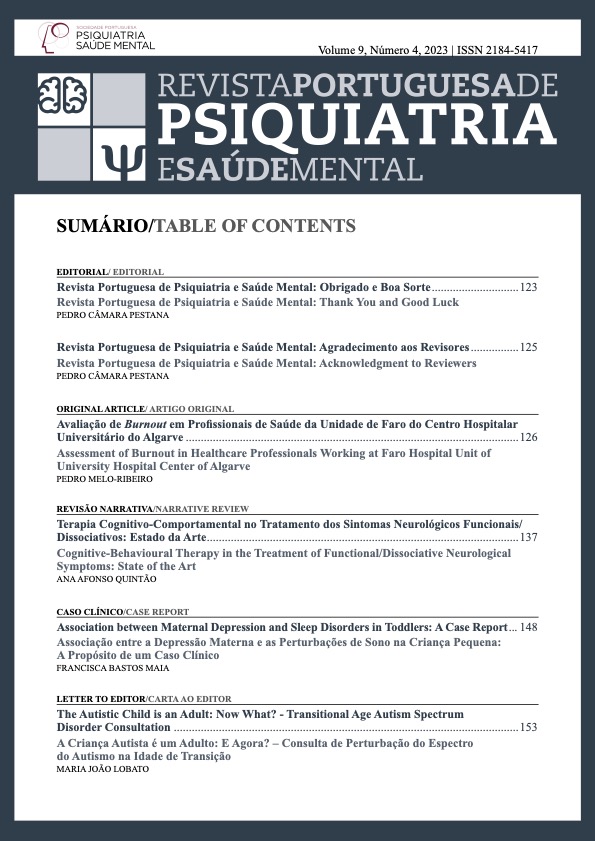Terapia Cognitivo‐Comportamental no Tratamento dos Sintomas Neurológicos Funcionais/Dissociativos: Estado da Arte
DOI:
https://doi.org/10.51338/rppsm.508Palavras-chave:
Perturbação Conversiva, Perturbação Dissociativa, Terapia Cognitivo-ComportamentalResumo
Introdução: Os sintomas neurológicos funcionais/dissociativos (SNF/D) geram incapacidade, diminuição de produtividade e da qualidade de vida. A abordagem terapêutica é ainda pouco clara; a terapia cognitivo-comportamental (TCC) parece apresentar resultados positivos. Esta revisão pretende sumarizar evidência sobre eficácia da TCC no tratamento dos SNF/D.Métodos: Revisão não sistemática da literatura: pesquisa na base de dados PubMed/Medline, utilizando guidelines PRISMA para scoping reviews, com termos relacionados com SNF/D e TCC.
Resultados: Vários estudos descrevem vantagens da TCC no tratamento de tremor funcional; tontura postural-perceptiva persistente; crises não-epilépticas psicogénicas; várias perturbações funcionais do movimento; e SNF/D no geral, com melhoria nos outcomes primários (redução de sintomas físicos) e secundários (nível de funcionamento, qualidade de vida, estado mental, ansiedade/depressão, utilização de serviços). Alguns estudos analisaram intervenções psicológicas no geral, e não TCC especificamente. Uma revisão sobre neuromodulação no tratamento dos SNF/D refere que a sua eficácia não está provada; especula que a combinação com TCC pode ser promissora.
Discussão: Estudos recentes referem que no geral, existe pouca evidência de elevada qualidade; consideram que alguns estudos têm elevado risco de viés e não têm análise de qualidade de evidência apropriada. Foram encontradas algumas contradições entre estudos, por exemplo em relação à melhoria do nível de funcionamento e à redução do número de convulsões. No entanto, a maioria dos estudos reporta alguma evidência sobre a eficácia da TCC no tratamento de diferentes SNF/D, quer a nível de outcomes primários como secundários, alguns em conjunto com fisioterapia e outras modalidades psicoterapêuticas, reforçando a importância de abordagem multidisciplinar.
Conclusão: Os estudos realizados até à data apresentam problemas metodológicos importantes, com baixo número de doentes incluídos, e heterogeneidade dos doentes, o que dificulta a comparação entre estudos e obtenção de estudos de elevada qualidade metodológica. Apesar de não existir um consenso sobre a melhor abordagem terapêutica, e da baixa qualidade metodológica existente até à data, a TCC é a que tem demonstrado melhores resultados (em outcomes primários e secundários) no tratamento dos SNF/D. São necessários mais estudos, com rigor metodológico, que permitam validar os resultados positivos obtidos até ao momento.
Downloads
Referências
Edwards MJ, Bhatia KP. Functional (psychogenic) movement disorders: merging mind and brain. Lancet Neurol. 2012;11:250-60. doi:10.1016/ S1474-4422(11)70310-6 DOI: https://doi.org/10.1016/S1474-4422(11)70310-6
Stone J, Wojcik W, Durrance D, Carson A, Lewis S, MacKenzie L, et al. What should we say to patients with symptoms unexplained by disease? The “number needed to offend.” BMJ. 2002;325:1449-50. doi: 10.1136/bmj.325.7378.1449. DOI: https://doi.org/10.1136/bmj.325.7378.1449
The ICD‐11 Classification of Mental and Behavioural Disorders – Diagnostic criteria for research. 11th edition. Geneva: World Health Organization; 2018.
Diagnostic and Statistical Manual of Mental Disorders, DSM-5-TR. 5th edition-Text Revision. Chicago: American Psychiatric Publishing; 2013.
Hallett M, Aybek S, Dworetzky BA, McWhirter L, Staab J, Stone J. Functional Neurological Disorder: New Phenotypes, Common Mechanisms. Lancet Neurol. 2022;21:537-50. doi:10.1016/S1474-4422(21)00422-1 DOI: https://doi.org/10.1016/S1474-4422(21)00422-1
Duncan R, Razvi S, Mulhern S. Newly presenting psychogenic nonepileptic seizures: incidence, population characteristics, and early outcome from a prospective audit of a first seizure clinic. Epilepsy Behav. 2011;20:308-11. doi:10.1016/j.yebeh.2010.10.022 DOI: https://doi.org/10.1016/j.yebeh.2010.10.022
Goldstein LH, Deale AC, Mitchell-O’Malley SJ, Toone BK, Mellers JD. An evaluation of cognitive behavioral therapy as a treatment for dissociative seizures: a pilot study. Cogn Behav Neurol. 2004;17:41-9. doi:10.1097/00146965-200403000-00005 DOI: https://doi.org/10.1097/00146965-200403000-00005
Erro R, Brigo F, Trinka E, Turri G, Edwards MJ, Tinazzi M. Psychogenic nonepileptic seizures and movement disorders. Neurol Clin Pract. 2016;6:138-49. doi:10.1212/CPJ.0000000000000235. DOI: https://doi.org/10.1212/CPJ.0000000000000235
Geddes JR, Andreasen NC, Goodwin GM. New Oxford Textbook of Psychiatry.3rd ed. Oxford:Oxford University Press; 2020. DOI: https://doi.org/10.1093/med/9780198713005.001.0001
Stone J, Sharpe M, Binzer M. Motor conversion symptoms and pseudoseizures: a comparison of clinical characteristics. Psychosomatics. 2004;45:492-9. doi:10.1176/appi.psy.45.6.492 DOI: https://doi.org/10.1176/appi.psy.45.6.492
Edwards MJ, Yogarajah M, Stone J. Why functional neurological disorder is not feigning or malingering. Nat Rev Neurol. 2023;19:246-56. doi:10.1038/ s41582-022-00765-z DOI: https://doi.org/10.1038/s41582-022-00765-z
Morgante F, Edwards MJ, Espay AJ. Psychogenic movement disorders. Continuum.2013;191383-96. doi:10.1212/01.CON.0000436160.41071.79 DOI: https://doi.org/10.1212/01.CON.0000436160.41071.79
LaFrance Jr. WC, Baker GA, Duncan R, Goldstein LH, Reuber M. Minimum requirements for the diagnosis of psychogenic nonepileptic seizures: A staged approach. Epilepsia. 2013;54:2005-18. doi:10.1111/epi.12356 DOI: https://doi.org/10.1111/epi.12356
Avbersek A, Sisodiya S. Does the primary literature provide support for clinical signs used to distinguish psychogenic nonepileptic seizures from epileptic seizures? J Neurol Neurosurg Psychiatry. 2010;81:719-25. doi:10.1136/jnnp.2009.197996 DOI: https://doi.org/10.1136/jnnp.2009.197996
Gonsalvez I, Spagnolo P, Dworetzky B, Baslet G. Neurostimulation for the treatment of functional neurological disorder: A systematic review. Epilepsy Behav Rep. 2021;16:100501. doi:10.1016/j.ebr.2021.100501 DOI: https://doi.org/10.1016/j.ebr.2021.100501
Martlew J, Pulman J, Marson AG. Psychological and behavioural treatments for adults with non-epileptic attack disorder. Cochrane Database Syst Rev. 2014:CD006370. doi:10.1002/14651858.CD006370.pub2 DOI: https://doi.org/10.1002/14651858.CD006370.pub2
Beck AT, Haigh EA. Advances in cognitive theory and therapy: the generic cognitive model. Annu Rev Clin Psychol. 2014;10:1-24. doi:10.1146/ annurev-clinpsy-032813-153734 DOI: https://doi.org/10.1146/annurev-clinpsy-032813-153734
Page MJ, McKenzie JE, Bossuyt PM, Boutron I, Hoffmann TC, Mulrow CD, et al. The PRISMA 2020 statement: an updated guideline for reporting systematic reviews. BMJ. 2021;372:n71. doi:10.1136/bmj.n71 DOI: https://doi.org/10.1136/bmj.n71
Bartl M, Kewitsch R, Hallett M, Tegenthoff M, Paulus W. Diagnosis and therapy of functional tremor a systematic review illustrated by a case report. Neurol Res Pract. 2020;2:35. doi:10.1186/s42466-020-00073-1 DOI: https://doi.org/10.1186/s42466-020-00073-1
Espay AJ, Ries S, Maloney T, Vannest J, Neefus E, Dwivedi AK, et al. Clinical and neural responses to cognitive behavioral therapy for functional tremor. Neurology. 2019;93:e1787-98. doi:10.1212/ WNL.0000000000008442 DOI: https://doi.org/10.1212/WNL.0000000000008442
Trinidade A, Goebel JA. Persistent postural-perceptual dizziness-a systematic review of the literature for the balance specialist. Otol Neurotol. 2018;39:1291-303. doi:10.1097/MAO.0000000000002010 DOI: https://doi.org/10.1097/MAO.0000000000002010
Holmberg J, Karlberg M, Harlacher U, Rivano-Fischer M, Magnusson M. Treatment of phobic postural vertigo. A controlled study of cognitive-behavioral therapy and self-controlled desensitization. J Neurol. 2006;253:500-6. doi:10.1007/s00415-005-0050-6 DOI: https://doi.org/10.1007/s00415-005-0050-6
Schmid DA, Allum JHJ, Sleptsova M, Gross S, Gaab J, Welge-Lüssen A, et al. Effects of a program of cognitive-behavioural group therapy, vestibular rehabilitation, and psychoeducational explanations on patients with dizziness and no quantified balance deficit, compared to patients with dizziness and a quantified balance deficit. J Psychosom Res. 2018;105:21‐30. doi:10.1016/j.jpsychores.2017.11.020 DOI: https://doi.org/10.1016/j.jpsychores.2017.11.020
Yu YC, Xue H, Zhang YX, Zhou J. Cognitive behavior therapy as augmentation for sertraline in treating patients with persistent postural-perceptual dizziness. Biomed Res Int. 2018;2018:8518631. doi:10.1155/2018/8518631 DOI: https://doi.org/10.1155/2018/8518631
Gutkin M, McLean L, Brown R, Kanaan RA. Systematic review of psychotherapy for adults with functional neurological disorder. J Neurol Neurosurg Psychiatry. Published online November 5, 2020:jnnp-2019-321926. doi:10.1136/jnnp-2019-321926 DOI: https://doi.org/10.1136/jnnp-2019-321926
Goldstein LH, Chalder T, Chigwedere C, Khondoker MR, Moriarty J, Toone BK, et al. Cognitive-behavioral therapy for psychogenic nonepileptic seizures: a pilot RCT. Neurology. 2010;74:1986-94. doi:10.1212/ WNL.0b013e3181e39658 DOI: https://doi.org/10.1212/WNL.0b013e3181e39658
Goldstein LH, Robinson EJ, Mellers JDC, Stone J, Carson A, Reuber M, et al. Cognitive behavioural therapy for adults with dissociative seizures (CODES): a pragmatic, multicentre, randomised controlled trial. Lancet Psychiatry. 2020;7:491-505. doi:10.1016/ S2215-0366(20)30128-0
LaFrance WC, Baird GL, Barry JJ, Blum AS, Webb AF, Keitner GI, et al. Multicenter pilot treatment trial for psychogenic nonepileptic seizures: a randomized clinical trial. JAMA Psychiatry. 2014;71:997-1005. doi:10.1001/jamapsychiatry.2014.817 DOI: https://doi.org/10.1001/jamapsychiatry.2014.817
Sharpe M, Walker J, Williams C, Stone J, Cavanagh J, Murray G, et al. Guided self-help for functional (psychogenic) symptoms: a randomized controlled efficacy trial. Neurology. 2011;77:564‐72. doi:10.1212/ WNL.0b013e318228c0c7 DOI: https://doi.org/10.1212/WNL.0b013e318228c0c7
Dallocchio C, Tinazzi M, Bombieri F, Arnó N, Erro R. Cognitive Behavioural Therapy and Adjunctive Physical Activity for Functional Movement Disorders (Conversion Disorder): A Pilot, Single-Blinded, Randomized Study. Psychother Psychosom. 2016;85:381-83. doi:10.1159/000446660 DOI: https://doi.org/10.1159/000446660
Carlson P, Nicholson Perry K. Psychological interventions for psychogenic non-epileptic seizures: A meta-analysis. Seizure. 2017;45:142-50. doi:10.1016/j. seizure.2016.12.007 DOI: https://doi.org/10.1016/j.seizure.2016.12.007
Berezowski L, Ludwig L, Martin A, Löwe B, Shedden-Mora MC. Early psychological interventions for somatic symptom disorder and functional somatic syndromes: a systematic review and meta-analysis. Psychosom Med. 2022;84:325-38. doi:10.1097/ PSY.0000000000001011 DOI: https://doi.org/10.1097/PSY.0000000000001011
Ludot M, Merlo M, Ibrahim N, Piot MA, Lefèvre H, Carles ME, et al. “Somatic symptom disorders” in adolescence. A systematic review of the recent literature. Encephale. 2021;47:596-604. doi:10.1016/j. encep.2021.04.007 DOI: https://doi.org/10.1016/j.encep.2021.04.007
Vugts MAP, Joosen MCW, van der Geer JE, Zedlitz AM, Vrijhoef HJ. The effectiveness of various computer-based interventions for patients with chronic pain or functional somatic syndromes: A systematic review and meta-analysis. PLoS One. 2018;13:e0196467. doi:10.1371/journal.pone.0196467 DOI: https://doi.org/10.1371/journal.pone.0196467
Rosendal M, Blankenstein AH, Morriss R, Fink P, Sharpe M, Burton C. Enhanced care by generalists for functional somatic symptoms and disorders in primary care. Cochrane Database Syst Rev. 2013:CD008142. doi:10.1002/14651858.CD008142.pub2 DOI: https://doi.org/10.1002/14651858.CD008142.pub2
Ganslev CA, Storebø OJ, Callesen HE, Ruddy R, Søgaard U. Psychosocial interventions for conversion and dissociative disorders in adults. Cochrane Database Syst Rev. 2020;7:CD005331. doi:10.1002/14651858. CD005331.pub3 DOI: https://doi.org/10.1002/14651858.CD005331.pub3
Aamir S, Hamayon S. Behavior therapy in dissociative convulsion disorder. J Depress Anxiety. 2012;01. doi:10.4172/2167-1044.1000103 DOI: https://doi.org/10.4172/2167-1044.1000103
Khattak T, Farooq S, Jan B. Behavior therapy in dissociative convulsions disorder. J Coll Physicians Surg Pak. 2006;16:359-63.
Jordbru AA, Smedstad LM, Klungsøyr O, Martinsen EW. Psychogenic gait disorder: a randomized controlled trial of physical rehabilitation with one-year follow-up. J Rehabil Med. 2014;46:181-7. doi:10.2340/16501977-1246 DOI: https://doi.org/10.2340/16501977-1246
Nielsen G, Buszewicz M, Stevenson F, Hunter R, Holt K, Dudziec M, et al. Randomised feasibility study of physiotherapy for patients with functional motor symptoms. J Neurol Neurosurg Psychiatry. 2017;88:484-90. doi:10.1136/jnnp-2016-314408 DOI: https://doi.org/10.1136/jnnp-2016-314408
Tolchin B, Baslet G, Suzuki J, Martino S, Blumenfeld H, Hirsch LJ, et al. Randomized controlled trial of motivational interviewing for psychogenic nonepileptic seizures. Epilepsia. 2019;60:986-95. doi:10.1111/ epi.14728 DOI: https://doi.org/10.1111/epi.14728








